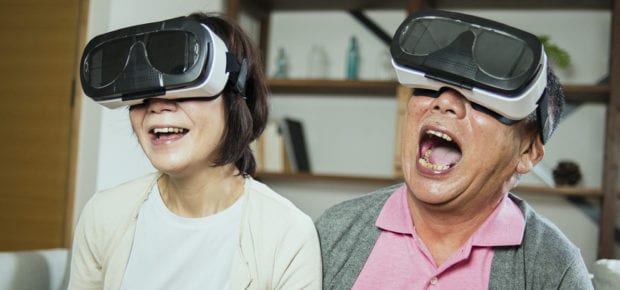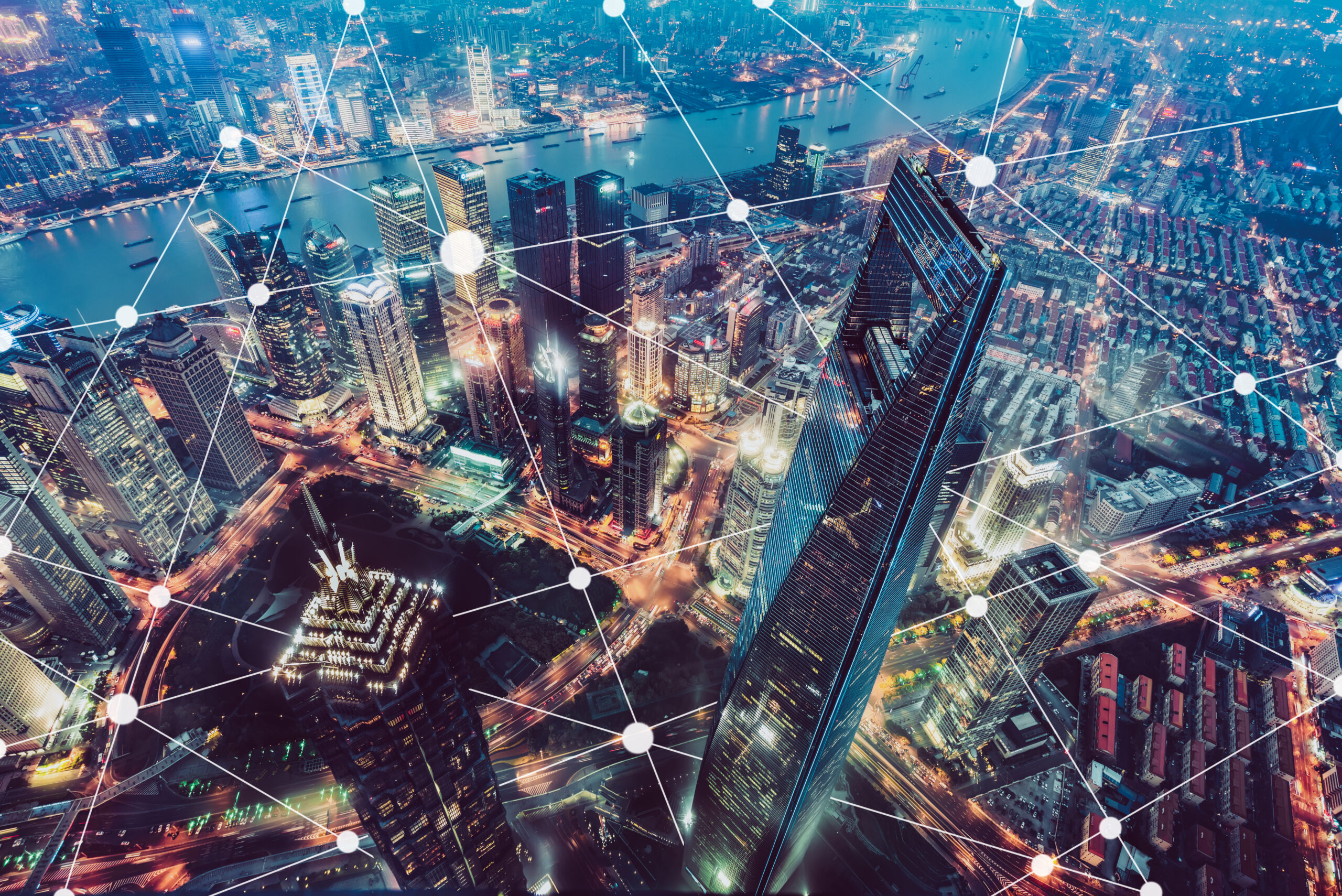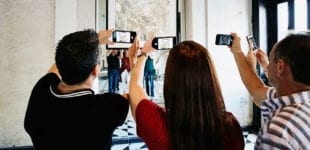November 27, 2018
To date, much of the innovation we’ve seen with virtual reality (VR) has focused on optics and the ability to create believable landscapes for users to interact with. But researchers worldwide aren’t stopping there; strides are being made to create more believable experiences for touch, sound and smell as well.
At Ecole Polytechnique Fédérale de Lausanne in Switzerland, researchers are focused on the importance of passive haptic feedback in making simulations feel believable. At the most basic level, this centers on the experience of touching one’s own body while controlling an avatar: “When carefully treated, the body may act as a free source of high fidelity haptic feedback; if neglected however, it will cause inconsistencies that will lessen the impact of any full-body tracked application.”
Making the experience of self-contact consistent has an outsize effect on making the virtual feel real, since people are more sensitive to inconsistencies than they are to precise movements, the researchers say. As motion capture devices become better and cheaper, this should be increasingly achievable.
Part of being truly immersed in a simulation is having it sound realistic. At Chung-Ang University in South Korea, work is being done to build wireless speakers that can detect their position in a speaker setup and adjust their output accordingly. Using a speaker, a Raspberry Pi and a beacon, the author was able to get great accuracy with the speakers 3-4 meters apart. While surround-sound systems obviously exist already, this would allow for simple setup anywhere, eliminate wires and make the experience safer and more convincing for the user.
Lastly, in what’s perhaps the most radical approach, researchers in Malaysia are working on digitizing smell so that it can be replicated anywhere. Moving away from cartridges that contain chemicals, this approach uses electric current delivered directly to the nasal cells, which causes the recipient to perceive odors that aren’t there. While this was an uncomfortable and early-stage proof of concept, strides in this area would be exciting for VR and many different experiences online.
Sight remains of particular importance, so it’s still worth mentioning here. Researchers from Deakin University in Australia looking at the effects of virtual environments on our mental and cognitive states wrote a paper assessing visual fatigue from VR, which they say is more mental than muscular, since the brain gets overloaded with conflicting signals. While they faced a number of challenges in this pursuit, the work stands to have important implications for improving headset and display design.
To hear more on the latest breakthroughs in the world of VR, watch the special video series on our VR/MR page.





 Meaningful Momentum or Running in Place?
Meaningful Momentum or Running in Place? AI Through Our Ages
AI Through Our Ages Liquid Infrastructure: Our Planet's Most Precious Resource
Liquid Infrastructure: Our Planet's Most Precious Resource The Impact of Technology in 2025
The Impact of Technology in 2025 Quantum and AI: Safeguards or Threats to Cybersecurity?
Quantum and AI: Safeguards or Threats to Cybersecurity? Why AI Can't Live Without Us
Why AI Can't Live Without Us Bits, Bytes, Buildings and Bridges: Digital-Driven Infrastructure
Bits, Bytes, Buildings and Bridges: Digital-Driven Infrastructure Impact of Technology in 2024
Impact of Technology in 2024 Emerging AI Cybersecurity Challenges and Solutions
Emerging AI Cybersecurity Challenges and Solutions The Skies are Unlimited
The Skies are Unlimited Smart Cities 2030: How Tech is Reshaping Urbanscapes
Smart Cities 2030: How Tech is Reshaping Urbanscapes Impact of Technology 2023
Impact of Technology 2023 Cybersecurity for Life-Changing Innovations
Cybersecurity for Life-Changing Innovations Smarter Wearables Healthier Life
Smarter Wearables Healthier Life Infrastructure In Motion
Infrastructure In Motion The Impact of Tech in 2022 and Beyond
The Impact of Tech in 2022 and Beyond Cybersecurity, Technology and Protecting Our World
Cybersecurity, Technology and Protecting Our World How Technology Helps us Understand Our Health and Wellness
How Technology Helps us Understand Our Health and Wellness The Resilience of Humanity
The Resilience of Humanity Harnessing and Sustaining our Natural Resources
Harnessing and Sustaining our Natural Resources Creating Healthy Spaces Through Technology
Creating Healthy Spaces Through Technology Exceptional Infrastructure Challenges, Technology and Humanity
Exceptional Infrastructure Challenges, Technology and Humanity The Global Impact of IEEE's 802 Standards
The Global Impact of IEEE's 802 Standards Scenes of our Cyber Lives: The Security Threats and Technology Solutions Protecting Us
Scenes of our Cyber Lives: The Security Threats and Technology Solutions Protecting Us How Millennial Parents are Embracing Health and Wellness Technologies for Their Generation Alpha Kids
How Millennial Parents are Embracing Health and Wellness Technologies for Their Generation Alpha Kids Space Exploration, Technology and Our Lives
Space Exploration, Technology and Our Lives Global Innovation and the Environment
Global Innovation and the Environment How Technology, Privacy and Security are Changing Each Other (And Us)
How Technology, Privacy and Security are Changing Each Other (And Us) Find us in booth 31506, LVCC South Hall 3 and experience the Technology Moon Walk
Find us in booth 31506, LVCC South Hall 3 and experience the Technology Moon Walk Virtual and Mixed Reality
Virtual and Mixed Reality How Robots are Improving our Health
How Robots are Improving our Health IEEE Experts and the Robots They are Teaching
IEEE Experts and the Robots They are Teaching See how millennial parents around the world see AI impacting the lives of their tech-infused offspring
See how millennial parents around the world see AI impacting the lives of their tech-infused offspring Take the journey from farm to table and learn how IoT will help us reach the rising demand for food production
Take the journey from farm to table and learn how IoT will help us reach the rising demand for food production Watch technical experts discuss the latest cyber threats
Watch technical experts discuss the latest cyber threats Explore how researchers, teachers, explorers, healthcare and medical professionals use immersive technologies
Explore how researchers, teachers, explorers, healthcare and medical professionals use immersive technologies Follow the timeline to see how Generation AI will be impacted by technology
Follow the timeline to see how Generation AI will be impacted by technology Learn how your IoT data can be used by experiencing a day in a connected life
Learn how your IoT data can be used by experiencing a day in a connected life Listen to technical experts discuss the biggest security threats today
Listen to technical experts discuss the biggest security threats today See how tech has influenced and evolved with the Games
See how tech has influenced and evolved with the Games Enter our virtual home to explore the IoT (Internet of Things) technologies
Enter our virtual home to explore the IoT (Internet of Things) technologies Explore an interactive map showcasing exciting innovations in robotics
Explore an interactive map showcasing exciting innovations in robotics Interactively explore A.I. in recent Hollywood movies
Interactively explore A.I. in recent Hollywood movies Get immersed in technologies that will improve patients' lives
Get immersed in technologies that will improve patients' lives